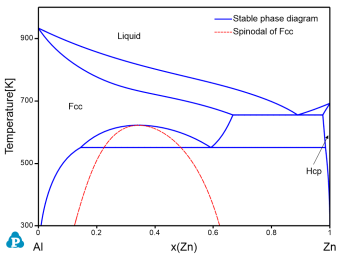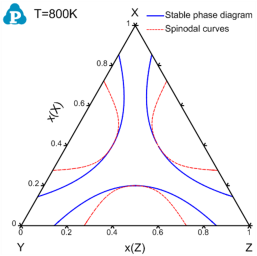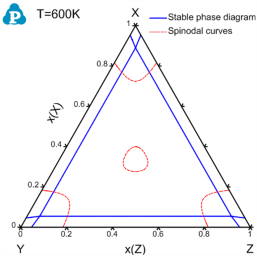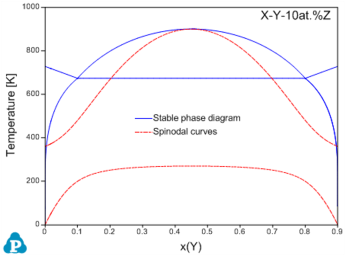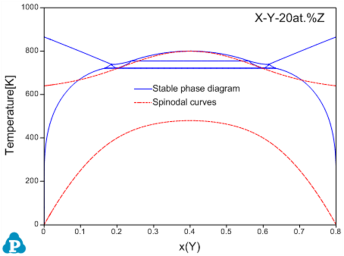Calculation of Spinodal Curve Using User-defined Property
Attention:As of Pandat 2023 and subsequent versions, a built-in function for the Hessian Matrix of Gibbs energy has been introduced. Users are no longer required to utilize the previously defined user property function. Detailed information on this feature can be found in the Section Hessian Matrix of Gibbs Energy .
A Spinodal curve is where the determinant of the Hessian of Gibbs free energy with respect to composition is zero. For a phase with c-components, above condition is expressed as
|
|
(1) |
where the molar fraction of component c is chosen as the dependent variable. The second derivative of G w.r.t. molar fractions can be calculated from the thermodynamic factors:
|
|
(2) |
Example #1: Spinodal curve of Fcc phase in the Al-Zn binary system
In this example, the spinodal curve of the Fcc phase in the Al-Zn binary system is calculated through user-defined property. A user-defined property d2GdxZn2 for the Fcc phase is defined in AlZn_Spinodal.tdb as:
Property d2GdxZn2 298.15 ThF(Zn,Zn@Fcc)-ThF(Al,Zn@Fcc)-ThF(Zn,Al@Fcc)+ThF(Al,Al@Fcc); 6000 N !
where ThF(Zn,Zn@Fcc), ThF(Al,Zn@Fcc), ThF(Zn,Al@Fcc), and ThF(Al,Al@Fcc) are the thermodynamic factors of Fcc phase. Since the value of d2GdxZn2 is usually a large number, we define the Hessian function, HSN, as d2GdxZn2 multiplied by a factor of 10−4:
Property HSN 298.15 1e-4*d2 GdxZn2; 6000 N !
As shown in the AlZn_Spinodal.pbfx, the AlZn_Spinodal.tdb is appended to the AlMgZn.tdb. The spinodal line is calculated through contour mapping by using following conditions:
<contour name="Spinodal" property="HSN" start="0" stop="0" step="1"/>
<equilibrium_type type="individual"/>
The calculated Fcc spinodal is shown in Figure 1 with the stable Al-Zn binary phase diagram.
Example #2: Spinodal curve of Fcc phase in the X-Y-Z ternary system
In this example, the original database is XYZ.tdb, and the user-defined HSN property is defined in XYZ_Spinodal.tdb as described below:
Property d2Gdx2 298.15 ThF(Y,Y@Fcc)-ThF(X,Y@Fcc)-ThF(Y,X@Fcc)+ThF(X,X@Fcc); 6000 N !
Property d2Gdy2 298.15 ThF(Z,Z@Fcc)-ThF(X,Z@Fcc)-ThF(Z,X@Fcc)+ThF(X,X@Fcc); 6000 N !
Property d2Gdxy 298.15 ThF(Y,Z@Fcc)-ThF(X,Z@Fcc)-ThF(Y,X@Fcc)+ThF(X,X@Fcc); 6000 N !
Property HSN 298.15 1e-10*(d2Gdx2 * d2Gdy2 - d2Gdxy * d2Gdxy); 6000 N !
Note that the HSN property within the XYZ ternary system is derived and described as a function of the thermodynamic factor ThF. A factor of 10−10 is used to scale the HSN property since the numerical value of HSN is very big.
Again the spinodal lines are calculated through contour mapping. Details can be found in XYZ_Isotherm_Spinodal.pbfx and XYZ_Isopleth_Spinodal.pbfx. Figure 2 and Figure 3 show the calculated spinodal curves superimposed on the stable phase diagrams.
